Is iCloud safe? Understanding Apple’s cloud security
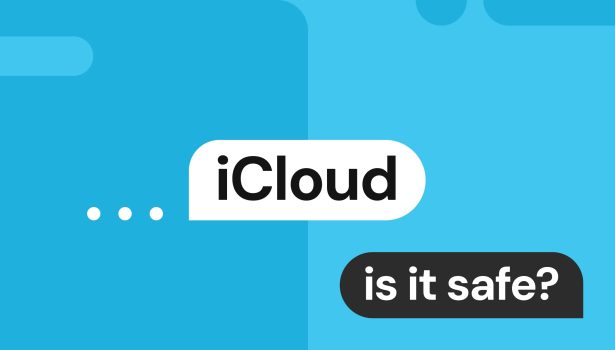
Security features such as data encryption and two-factor authentication make iCloud safe for most users. However, end-to-end encryption isn’t available for all iCloud services, meaning Apple can potentially access some of your data – and so can authorities, if Apple is legally compelled to hand it over.
What is iCloud?
iCloud is Apple’s cloud data storage service. It’s used to store photos, contacts, messages, files, backups, and other data. Key iCloud features include:
- iCloud Drive: Cloud file storage and sharing
- Photos: Picture storage and sharing
- Backup: Mobile device (iPhone, iPad) backups
- Keychain: Password management
iCloud syncs across all your Apple devices, meaning a photo you take with your iPhone will automatically be available on your iPad and MacBook. As the default storage option for iPhones and Macs, iCloud’s tight integration between devices makes it central to the Apple ecosystem.
Basic iCloud accounts are free and come with 5GB of storage plus an email account. iCloud+ plans offer additional features such as Hide My Email, Private Relay, and custom email domains. Storage tiers range from $0.99/mo. for 50GB up to $59.99/mo. for 12TB.
How secure is iCloud?
iCloud offers strong security features, such as encryption and two-factor authentication, making it secure enough for many users. However, it’s important to understand exactly how iCloud encryption works as it has some limitations.
iCloud encrypts your data in transit and at rest, but your level of protection depends on whether you use standard encryption or enable Advanced Data Protection (ADP):
- Standard: Encryption keys are held by Apple, which is useful if you need Apple’s help to recover your account. However, this also allows Apple to decrypt and read your data.
- ADP: Encryption keys are held on your devices, so Apple doesn’t have access to them and cannot decrypt or read your data.
Some categories like passwords and health data are always protected with end-to-end encryption (E2EE), even without ADP. ADP extends this encryption to additional categories such as device backups and Photos.
However, end-to-end encryption isn’t available for some services because Apple says it would prevent full functionality. For example, calendar apps can’t automatically schedule events from emails with end-to-end encryption.
Here are some examples of which iCloud services offer end-to-end encryption and when.
| Always E2EE | ADP | Never E2EE |
|---|---|---|
| Passwords Health info Journal info Maps | Photos Drive files Notes Reminders Safari bookmarks Backups | iCloud Mail Contacts Calendars |
iCloud security limitations
iCloud security limitations include:
- If ADP isn’t enabled, Apple can access your files and photos – and they could be compelled to share your data with authorities if presented with a court order.
- Even with ADP enabled, Apple can still access your email, contacts, and calendar data.
- If someone gains access to your device, they can view your iCloud data.
Additionally, even ADP won’t necessarily protect your information. When the United Kingdom demanded Apple turn off the ADP feature so its government could access user data, Apple complied.
Is iCloud safe from hackers?
Though there is never a guarantee that hackers can’t find an exploit in any data system, iCloud’s robust security makes it relatively safe from hackers.
In fact, iCloud accounts are rarely hacked via brute force. Most compromises and historical breaches come from human factors such as:
- Weak passwords: Many people continue to use passwords that are easy for hackers and scammers to guess, especially when those passwords include personal identifiers (such as birthdays and addresses) that are publicly available on social media or people-search sites.
- Phishing: Emails that appear to come directly from Apple and convince you to click on malicious links or share sensitive information that can be used to access your iCloud account.
- Other data breaches: If you reuse your iCloud login credentials on other sites and services, and one is breached, those credentials can be used to access your iCloud account.
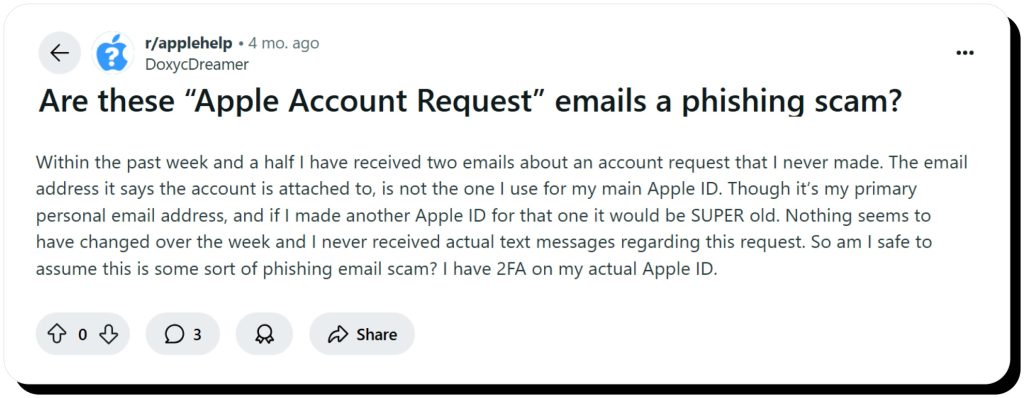
Two well-known celebrity incidents illustrate how human factors are more likely to expose sensitive information than an iCloud data breach:
- In 2014, scammers used phishing emails to trick actresses such as Jennifer Lawrence, Kirsten Dunst, and Kate Upton into sharing their iCloud usernames and passwords. The scammers then accessed their private photos and posted them online.
- In 2011, a hacker used Apple’s “forgot my password” feature to hack celebrity email accounts and steal their private photos. He was able to use personal information he found online to answer their security questions.
Is iCloud email safe?
With two-factor authentication and TLS encryption in transit and at rest, iCloud email is generally considered safe. However, it doesn’t have end-to-end encryption (even with ADP enabled), so it’s not ideal for journalists, whistleblowers, or privacy advocates who require a higher level of security to protect sensitive information.
Admittedly, there are some benefits to not using end-to-end encryption – primarily, that other apps can access email data (such as calendar apps automatically scheduling appointments from email). However, Apple is able to access your emails and could share them with law enforcement if legally compelled.
If you’re someone who handles sensitive data over email or is simply serious about email security, you should consider a service like Proton Mail that features end-to-end encryption.
It’s also a good idea to consider an email service that’s not subject to laws that require providers to hand sensitive information over to federal agencies. For example, Apple is based in the U.S., where authorities can access your email with a warrant. In contrast, Proton Mail is based in Switzerland, which has robust privacy laws that prevent companies from sharing user information with foreign governments (like the U.S.). Even if they could, the data would be encrypted and unreadable.
How to secure your iCloud account
Here’s how to secure iCloud and protect your sensitive data.
Enable Advanced Data Protection
Though it’s important to note that it doesn’t cover calendars, contacts, or email, ADP extends end-to-end encryption to 25 other data categories. Those include Photos, Notes, Voice Memos, and Backup.
Set up 2FA
Two-factor authentication helps prevent unauthorized access to your account. In general, it’s better to use an authenticator app for 2FA than to use SMS, but any kind of 2FA adds an extra layer of security.
Enable Find My iPhone, Activation Lock, and Lockdown Mode
Find My iPhone makes it easy to locate your device if it’s misplaced or stolen, while Activation Lock stops thieves from resetting your phone by requiring the original Apple ID and password. Journalists, whistleblowers, privacy advocates, and others who have ultra-sensitive data can also consider using Lockdown Mode, which limits device functionality to reduce the risk of targeted cyberattacks and data leaks, blocking features like link previews, web fonts, and certain message attachments.
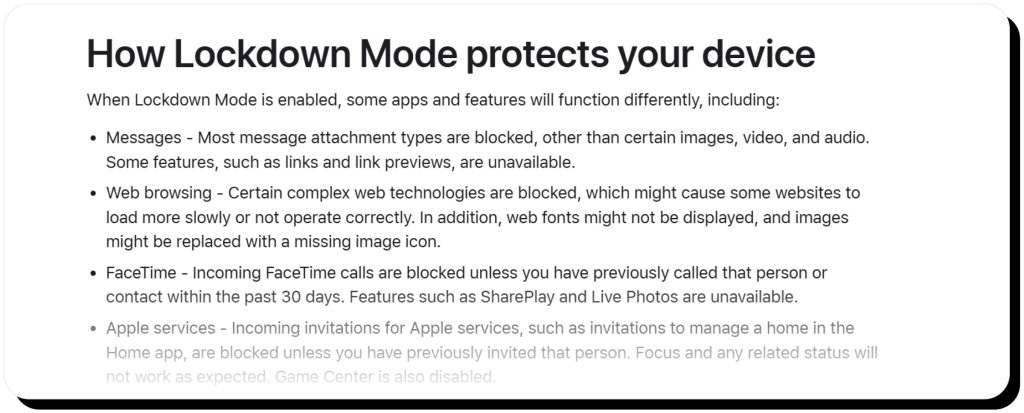
Keep software and iOS updated
Always keep your operating system, apps, and software updated on all your Apple devices. Updates often include security patches designed to prevent recently identified exploits.
Use a strong, unique password
Weak passwords are some of the easiest ways for bad actors to access your iCloud account. Use a strong password generator to create a random password and never use the same password for multiple accounts.
Audit logged in devices
Regularly check to make sure you recognize all devices that are logged into your iCloud account. If you have an iPhone or iPad, go to Settings -> Your Name and scroll to find a list of signed-in devices. If there are any you don’t recognize, tap it and select “Remove from Account.”
Remove yourself from people-search sites
Public data brokers AKA people-search sites post all kinds of personal details, including your full name, email address, phone numbers, current and past home addresses, relatives, interests, and more. This information can be exploited by scammers to guess your passwords or answer security questions. The best way to ensure your data isn’t used against you is to remove it from people-search sites—you can do it manually or sign up for an automatic service like Onerep.
Best practices to avoid phishing scams
As stated, most iCloud breaches are due to human factors, and phishing scams are some of the easiest ways for hackers to access your account. Follow these tips to avoid falling victim to iCloud phishing scams.
Learn to spot phishing emails and smishing texts
Any email that claims to be from Apple but requires you to take urgent action is suspicious. For example, they might state your account is locked and you need to click a link to restore access.
Other signs include misspellings and grammatical errors. Always check the sender, as official Apple emails come from addresses like apple.com and icloud.com, but keep in mind that scammers are good at spoofing email senders, too.
Verify Apple messages via the support portal
If you receive an unsolicited message that does appear to be from Apple, don’t follow any links. Instead, visit the official support portal, log in there, and confirm the message you received is legit before taking any action.
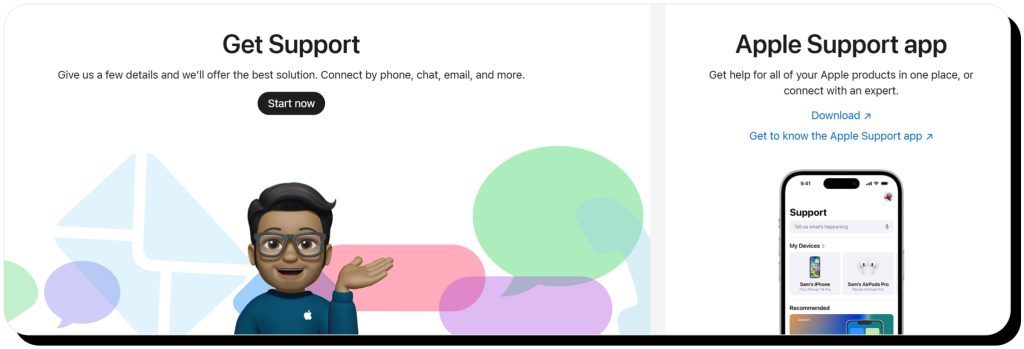
Never click on suspicious links or provide Apple ID credentials
Never click on links in unsolicited emails or texts, even if they look like they came from Apple, and never enter your Apple ID credentials on any sites they lead to. Scammers are good at making emails, texts, and websites look official, so always browse directly to Apple’s website and log in there.
Use a password manager
Password managers can recognize when you’re on an official Apple site or not. If you’re not, they won’t auto-fill your username and password, lending an extra layer of protection against accidentally sharing your account information with bad actors.
Report phishing attempts
This can help Apple investigate scammer tactics and develop security measures to prevent future phishing. Report any suspected phishing attempts by forwarding emails to [email protected].
FAQs
Can iCloud be hacked?
Yes, iCloud can potentially be hacked – just like any other online platform – but there are no known large-scale iCloud data breaches at the time of writing. Instead, iCloud data is typically leaked due to human factors, such as falling for phishing scams or using weak passwords.
Is iCloud secure?
iCloud offers data encryption and two-factor authentication, making it secure for most users. However, the fact that end-to-end encryption is not available for services like email means it’s not the most secure option, especially for individuals who require the utmost privacy.
Is iCloud encrypted?
Yes, iCloud is encrypted – but you’ll need to enable ADP to get end-to-end encryption on many services. Additionally, Calendar, Contacts, and Mail don’t use E2EE even with ADP.
Is iCloud storage safe?
iCloud storage is safe for most people, but the lack of end-to-end encryption across email and other services means it’s not the most secure option for journalists, whistleblowers, and privacy advocates.
Is iCloud Drive secure?
iCloud Drive is secure if you enable ADP, which provides end-to-end encryption for the files you upload to and store in Drive. Otherwise, your files are protected from hackers but can potentially be accessed and read by Apple.
Is it safe to store sensitive documents in iCloud?
Yes, iCloud is reasonably safe to store documents such as tax returns, insurance paperwork, and medical records, provided you have ADP and 2FA enabled. However, iCloud isn’t the most secure for legal documents, intellectual property, and confidential whistleblower information. Proton Drive and Tresorit are better alternatives for true confidentiality.
How do I know if my iCloud has been compromised?
Your iCloud account might be compromised if there are unrecognized devices on your account, you receive login alerts from unknown devices or locations, you receive unsolicited password reset emails, you find App Store charges you didn’t make, your iCloud storage is unexpectedly full, your 2FA settings have changed, or you’re locked out of your iCloud account. If you suspect your account is compromised, immediately change your password, remove unrecognized devices, enable 2FA, double-check your trusted phone number and recovery email, and report suspicious activity to Apple.

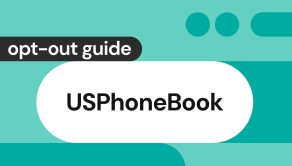
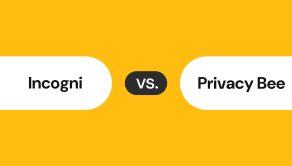


Mark comes from a strong background in the identity theft protection and consumer credit world, having spent 4 years at Experian, including working on FreeCreditReport and ProtectMyID. He is frequently featured on various media outlets, including MarketWatch, Yahoo News, WTVC, CBS News, and others.